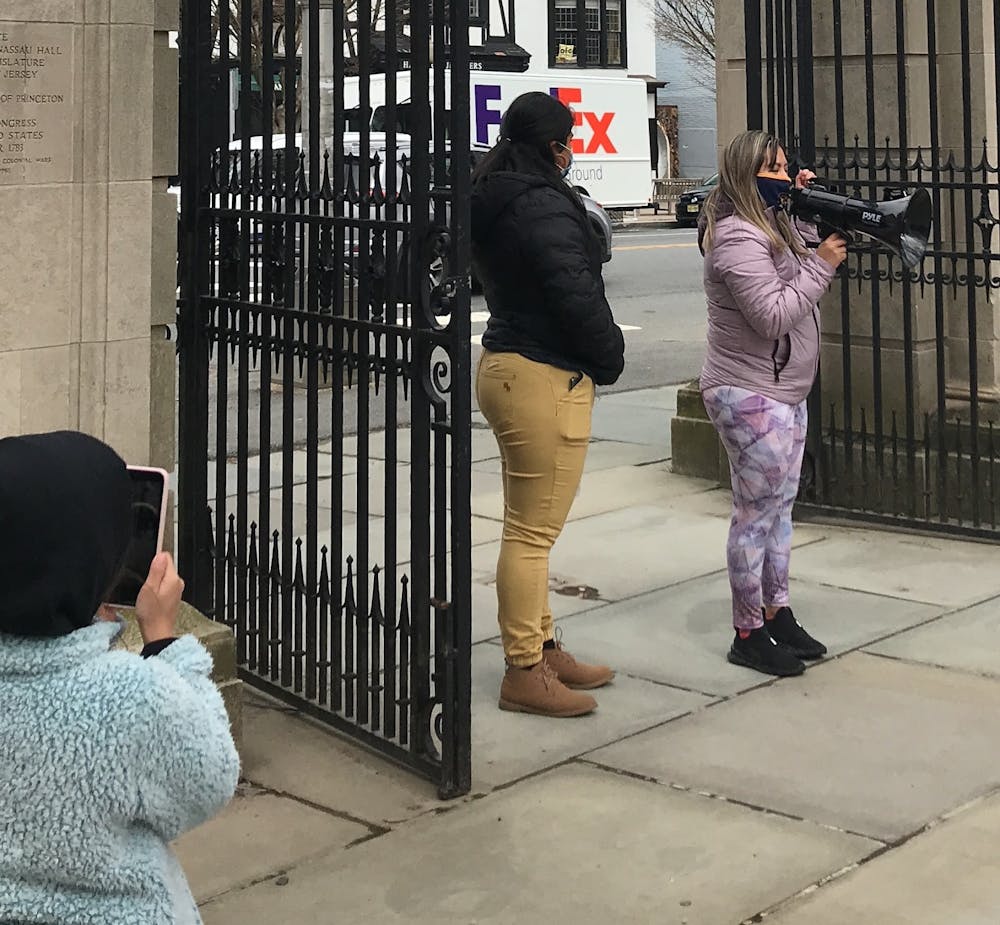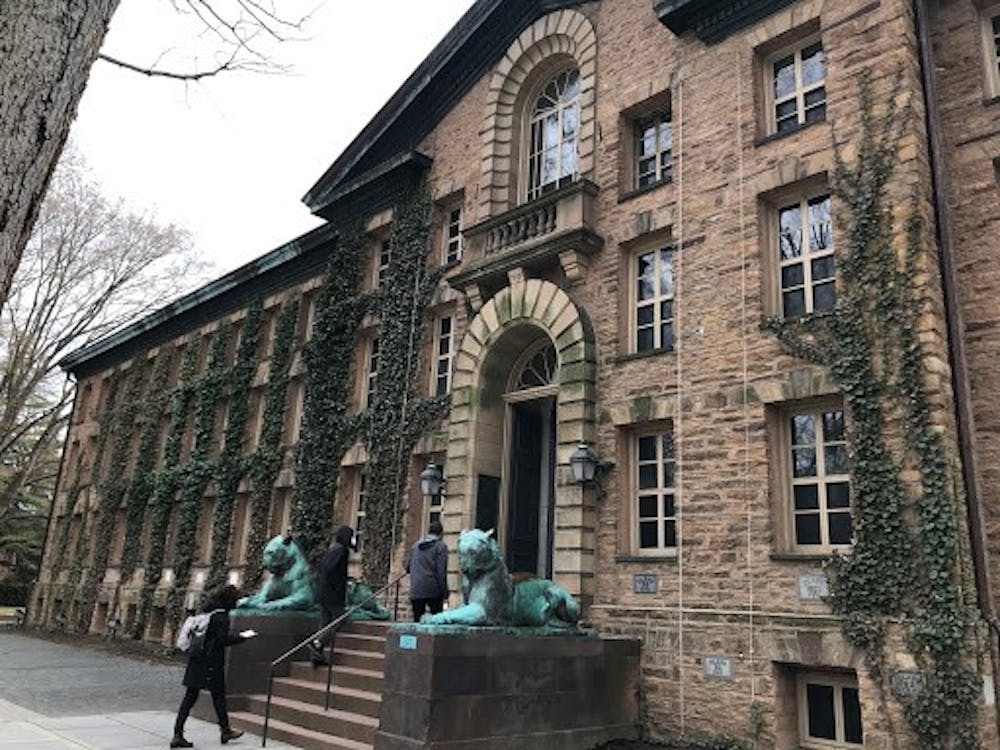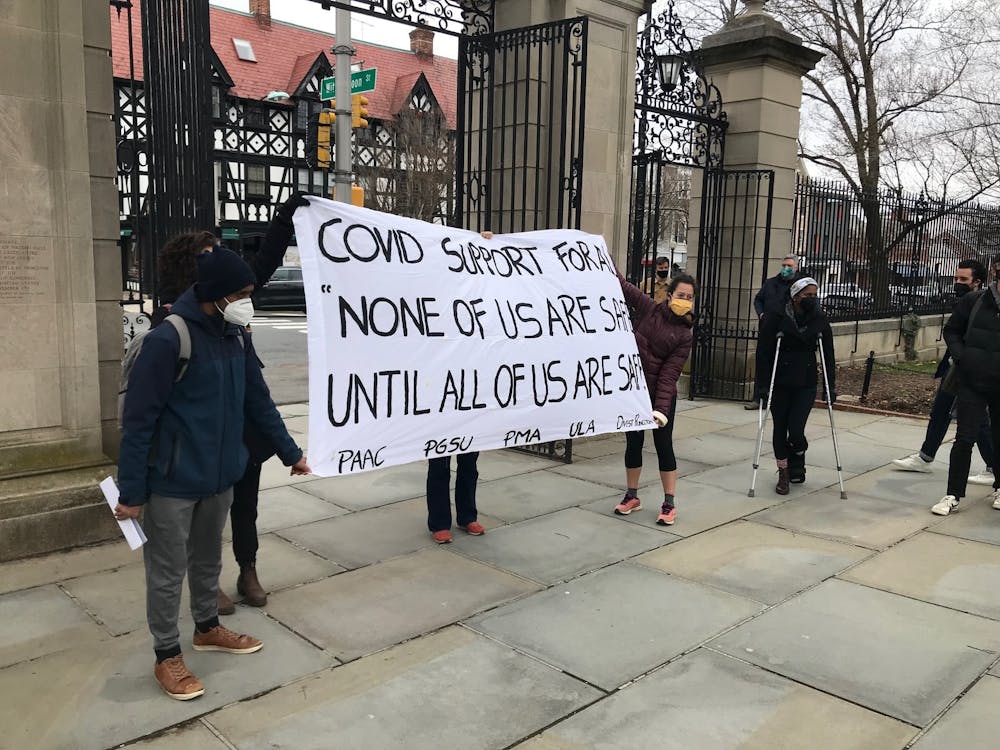On April 2 at 1 p.m., approximately 20 people gathered in a masked and socially-distanced demonstration at FitzRandolph Gate to support the delivery of a petition demanding that the University extend access to COVID-19 resources to the local community.
The crowd — consisting of representatives from Princeton Mutual Aid (PMA), Unidad Latina en Acción (ULA) New Jersey, Princeton Anti-Austerity Coalition (PAAC), Princeton Graduate Students United (PGSU), Princeton University Policy Student Government (PUPSG), and Divest Princeton — supported the delivery with a banner, speeches delivered in both English and Spanish, and call-and-response chants.
In unison, the crowd chanted:
“What do we want?”
“Vaccines for all!”
“When do we want it?”
“Now!”
“And if we don’t get it?”
“Shut ‘em down!”
Context for petition
This demonstration was one in a series of actions aimed at pressuring the University to increase support for the community during the pandemic with COVID-19 testing, contact tracing, and vaccine distribution.
The coalition held a protest in February and will have an event on May 1.

Organizers discussed the needs of the surrounding community in contrast to the expansive resources of the University, and a perceived lack of community involvement in administrative decision-making.
In a statement to The Daily Princetonian, University Spokesperson Ben Chang reiterated that the University’s “comprehensive approach to the pandemic” is in alignment with state policies and public health guidelines.
He also pointed to a recent meeting between University President Christopher Eisgruber ’83 and the Princeton Municipal Council in which town-gown partnerships during the pandemic were discussed.
“Throughout the COVID-19 pandemic, the University has worked closely with the democratically elected municipal, county, and state officials who represent the residents of our area,” Chang wrote. “We view this partnership as vital and we are grateful for the level of close cooperation and shared commitment.”
“It may be easy to assume the University can simply flip a switch and provide public health resources to tens of thousands of additional people,” Chang told the ‘Prince’ in a past statement. “That is simply not true.”
Attendees
Leah Bowers, a Postdoctoral Research Associate in the Chemistry department, delivered the petition — signed by almost 900 Princeton students, faculty, staff, and community members — alongside two graduate students.
Bowers expressed a belief that the virus’s potential spread from University students to workers in the surrounding community, coupled with her own access to University resources as a member of the on-campus asymptomatic testing program, makes this expansion essential.
“Princeton is not an isolated bubble,” she said.
The University currently provides testing and contact tracing for campus contract workers, and these workers will be eligible for vaccination through the University once New Jersey makes doses available to the University community.
“The fact that the University cannot offer testing services to the general public does not mean there is not a benefit to the region,” Chang wrote in a past statement.

Another member of ULA delivers a speech after passing her phone off to her daughter to continue a Facebook Live stream.
Isabella Shutt / The Daily Princetonian
A Princeton resident and member of ULA shared her family’s struggles with unemployment during the pandemic, before asserting that the groups’ demands are necessary for preserving the community’s human rights.
Peter Scharer ’22, a member of PAAC, said that the need for such demands also demonstrates the widening of inequality upheld by a large institution with vast resources.
“Community [COVID-19] testing is the very least that this University can do,” Scharer said. “We see how the University administration burdens local residents with added costs and increased risks — this time public health risks — even as the endowment rakes in hundreds of millions of dollars year after year.” The University endowment increased by approximately $500 million in the 2020 fiscal year.
Chang responded to a similar prior comment by explaining that the University’s foremost role is as an educational institution.
“Princeton University is not a hospital, a health care provider, or a commercial clinical lab… Princeton can — and is — making a difference during this pandemic through its research and teaching, not by becoming a health care provider,” he wrote.
Petition delivery
After the demonstration, three members in the asymptomatic testing protocol then walked to Nassau Hall and knocked. When no one answered, they slipped copies of the petition under the door. One of the deliverers told the ‘Prince’ that the organizations will email the petition to administrators until a response is received.

Demonstrators deliver the petition to Nassau Hall.
Isabella Shutt / The Daily Princetonian
Chang told the ‘Prince’ that the group’s organizers were informed in advance of the University’s policy barring members of the public from entering Nassau Hall and other University buildings.
“We provided an alternative means for the group to share information with the University,” he wrote. “It is unfortunate the group opted to disregard those precautions.”








